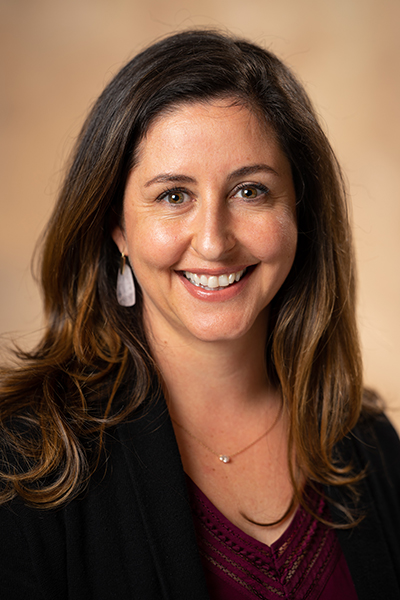by Matthew Smith
University of North Carolina at Chapel Hill School of Social Work associate professor Lisa de Saxe Zerden has been named the editor-in-chief of Social Work, the official journal of the National Association of Social Workers.
Zerden serves many roles at the School, including as the John A. Tate Early Career Scholar for Children in Need, the School’s Interprofessional Education and Practice Director, and as the deputy director of the UNC Behavioral Health Workforce Research Center.

Her research focuses on behavioral health workforce development and substance use curricula, exploring inequitable access to treatment and prevention, the role of social workers in integrated health care, and policies to support those initiatives and improve health.
We asked Zerden about her new role as editor-in-chief of the journal.
What is your research background and how do you see it shaping your editorial vision for Social Work?
One of the things that I love most about my academic career is writing. The peer-review process forces you to crystallize your thinking and synthesize a research project from beginning to end — sometimes having to summarize years of effort. Research is only effective if people read your work. Over the years, I have benefited from feedback given by countless reviewers; I am a reviewer and serve on the editorial boards of Social Work, Advances in Social Work and Social Work & Health Care. These experiences, along with guest editing for three special issues, have made me a more discerning consumer of peer-reviewed materials and a more thoughtful contributor to social work scholarship.
My vision for the journal is to continue accelerating social work policy and practice through research that has real-world implications. I want Social Work to continue to be “the” journal for the profession, one where readers across practice areas and stages of their career, find relevance in current, pragmatic, thoughtfully-vetted content which moves the profession forward.
Why did you decide to take on the role?
Social Work is the profession’s premier journal and the signature journal of the National Association of Social Workers Press. Addressing social issues requires reading new scholarship and staying up to date on practice findings, policy implications and advancements in the profession. I wanted to have a leadership role in a journal with this kind of reach, impacting researchers, faculty, students and practitioners on timely and relevant work that enhances the profession and social work’s impact. Before accepting the editor-in-chief role, I weighed the responsibility heavily. I decided this was the right time in my career to engage in national professional service and play a leadership role in shaping social work scholarship and research.
What are you most looking forward to in your role as editor-in-chief?
I am looking forward to being exposed to topics and foci that may be outside of my typical scope. This is an excellent opportunity to have a holistic view on what scholars are writing about across populations, settings and fields of practice. I am excited to work with colleagues around the country and the world to connect submitted work to reviewers and help expand who reads, reviews and submits to Social Work.
What have been your favorite publications to read in Social Work and how do you hope to see the journal evolve under your leadership?
One of my favorite articles is a 1983 article I was exposed to as a doctoral student by Mimi Abramowitz, titled: “Everyone Is on Welfare: ‘The Role of Redistribution in Social Policy’ Revisited.” This article is 40 years old and still relevant today.
What are some of the challenges you have seen the field face and how do you hope your role can help highlight some of the research focused on those obstacles?
Social work is a profession with enormous responsibility, not the least of which includes giving voice to social problems, offering context, and explaining social conditions. As a journal, Social Work offers researchers and practitioners an outlet to shed light on these important social issues and offer evidence and recommendations to improve practice and social change. It is a lengthy process to write a manuscript, wait for it to be reviewed, and one day get published.
Yet, the peer-review process takes time and works only as well as the reviewers who volunteer to provide meaningful feedback. In this role, it is my goal to draw upon a network of colleagues locally, nationally and abroad to be a part of this important process to strengthen our collective ability to share findings and contribute to advancing social work practice and policy.
On the other hand, what positives have you seen in the field and the work social workers are doing in those areas?
Peer-reviewed scholarship has the dual benefit not just of enhancing your own personal knowledge, but also helping you identify potential partners outside of your immediate sphere. I have found new collaborators, co-authors and colleagues in reading others’ published work and have since forged partnerships together. Without having read about their work in outlets such as Social Work, this connection would have been much harder to forge.
How do you see your role benefitting the School of Social Work and our researchers at UNC?
Beyond my personal growth and development as a faculty member at UNC, the School of Social Work will benefit from this editor-in-chief role as well. There is an enormous pool of talented faculty and world-class researchers who can serve as future editorial board members, manuscript reviewers, and as contributors to the journal. Additionally, the UNC School of Social Work’s reach can help to disseminate Social Work’s issues and amplify important findings within each issue.
Learn more about the journal Social Work online.
Related stories

Zerden, UNC partners awarded $1.92 million grant
UNC School of Social Work associate professor Lisa de Saxe Zerden’s grant will expand support and resources to address the behavioral healthcare needs of youth and their families.

Zerden selected for Academic Leaders Network
Lisa de Saxe Zerden was one of five UNC campus leaders selected to participate in the ACC Academic Leaders Network program for 2019-20.

